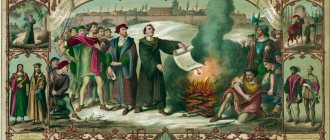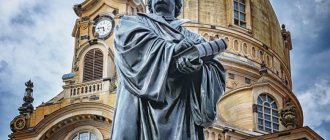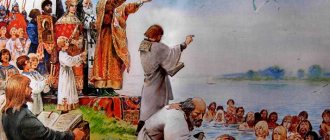For the Roman Catholic Church, the 16th century was a turning point - neither the political successes of Rome nor the involvement of the Holy See in the development of Renaissance culture protected Catholicism from a major crisis. The origins of the Reformation were changes in the spiritual climate of the late Middle Ages - the desire to comprehend God without the participation of the church, humanistic ideas, and the subjectivity of the religious feelings of believers. The initiator of the open schism in Catholicism was Martin Luther, who in 1517 openly criticized some church orders.
Catholic Church at the beginning of the Reformation
By the beginning of the 16th century, the popes were able to overcome the consequences of the conciliar movement, which, from the middle of the 14th century, tried to subordinate the popes to the decisions of the Ecumenical Councils. The Holy See strengthened its power and expanded its borders, optimized the financial system and increased revenues.
The popes led a luxurious lifestyle, involving all their relatives in government affairs. The young illegitimate children of the Roman pontiffs and their corrupt relatives, who occupied nominal but profitable positions, caused indignation, but did not surprise anyone.
The external side of church life amazed with its splendor and grandiose scope. Church construction, the spread of the cult of saints, mass pilgrimages and religious brotherhoods testified to the stability of the position of Catholicism in Europe. The church acquired its greatest influence in fragmented Germany, where, unlike France, England and Spain, it could dictate its will even to the central authorities.
The financial policy of the Holy See and local clergy caused many criticisms. Through the largest banking house in Germany, the Fuggers, huge funds were sent to Rome, received from the payment of church fees, from the trade in indulgences, fees for appointments to ecclesiastical positions, as well as proceeds from vacant church positions.
For money it was possible to acquire high church positions, it was only a matter of price. This happened with Margrave Albrecht of Bradenburg - he bought the position of archbishop and united three bishoprics of Germany under his authority, becoming second only to the emperor in rank status.
Attempts by secular authorities to limit the plunder of the country did not bring results. Emperor Maximilian I complained to Rome in 1510 and tried to reduce outgoing financial flows by concluding an agreement with the papacy, but this led to nothing.
Reichstag in Worms
Luther arrived in Worms on April 16, 1521, and was greeted by crowds of people. The Reichstag meeting began the next day and continued until April 19.
Luther refused to renounce his writings (about 20 titles) presented at the hearings. He declared that his polemical, anti-papal, edifying books did not contain anything reprehensible and did not contradict the interests of the empire. Luther called for turning to the Holy Scriptures and the arguments of reason for evidence.
Neither the representative of the bishopric, Johann von Ecken, nor the emperor, nor the nobility were prepared for such an answer. They expected Luther to justify himself, to persuade, or to expound his ideas on the standard questionnaire of the Inquisition, but the reformer was probably more concerned with another question - whether to require references to Scripture only from the ecclesiastical court, or whether it was obligatory for secular authorities as well.
In Luther's speeches, the thesis about the Protestant declaration of tolerance for the opinion of a Christian was also voiced. The preacher said that no one, including himself or even the pope, is immune from mistakes, including heretical ones. However, these errors still need to be proven - with the help of the same Holy Scripture. It was also supposed to serve as a measure of the personal conscience of the believer.
Luther's refusal was not a categorical decision; the reformer only said that he was unable to renounce his thoughts until they were refuted. Luther did not appeal to God's providence or will, he only emphasized his right to do exactly this and not otherwise.
The debate never took place. The Reichstag commission tried to persuade Luther to compromise and renounce at least part of his beliefs, but in response, the reformer argued that he did not want to go against his conscience. Supporters of the papal legate Aleander insisted on detaining the heretic, but Charles V, under the threat of a peasant uprising, was forced to release Luther.
Ideas of humanism
Humanists played an important role in the preparation of the Reformation, turning scientists into interpreters of biblical truths. Germany became the birthplace of humanism, where the most famous scientists worked at its universities - Conrad Celtis, Mucianus Rufus. The development of religious individualism and theological science was greatly influenced by the writings of Erasmus of Rotterdam (1469-1536).
Erasmus set out to “reconcile” enlightenment and religious piety, for which he turned to ancient philosophers and the fathers of the church. He contrasted scholastic disputes with simple and sincere righteousness, “Christian humanity,” close to the covenants of Christ. The philosopher criticized the clergy with their external observance of the cult, calling for them to focus on internal religiosity.
However, Erasmus did not touch upon the orthodox church foundations and specific individuals. Belonging to the next generation of humanists, Ulrich von Hutten (1488-1523) spoke out much more sharply and boldly - he criticized the policies of Rome and the dominance of church censorship in the sciences and art.
However, the humanists appealed primarily to an educated public who knew Latin and terminology. For other readers, publications were published in their native language, which addressed issues of the morality of clergy and the whole society, the financial and spiritual state of the church, and personal attitudes towards religion.
Behind the magnificent façade of Catholicism, psychological tension grew, as evidenced by frequent motifs in popular literature - the end of the world, dances of death, witchcraft.
The Beginning of the Reformation and Luther's 95 Theses
The spread of ideas about the ignorance and depravity of representatives of the church, led by the pope himself, was followed by attempts to correct the situation through reforms. The first blow to the foundations of the Catholic Church and the foundations of church scholasticism was struck by theologian Martin Luther (1483-1546), professor at the University of Wittenberg.
The son of a wealthy burgher and the grandson of a peasant, Luther was a man of strong faith and extraordinary intelligence. After graduating from the University of Erfurt, where, at the insistence of his father, he prepared for a legal career, Martin entered the Augustinian monastic order. In 1511, Luther settled in Wittenberg and became a doctor of divinity with a deep knowledge of the Bible.
Luther's reflections and reading of the writings of humanists led him to an idea that later became the basis of Protestantism. He came to the idea of saving a person through personal faith, as well as liberating society from evil by turning to early Christian ideals. Repentance, which was an important part of moral purification, was important in this concept.
The policy of the Catholic Church was such that sincere repentance was easily replaced by the purchase of indulgences. At that time, the trade in “absolution of sins” through the efforts of the monk Johann Tetzel and with the support of the Archbishop of Mainz Albrecht was put on a grand scale.
Luther was deeply outraged by what was happening, and at the end of October 1517, he came up with 95 theses devoted to criticism of Catholic dogmas on repentance and absolution. The theses were sent to the archbishop and published on the door of the parish church in Wittenberg.
The Church insisted on the possibility of saving the soul only with the participation of clergy and with the performance of certain rituals, among which was the purchase of indulgences. Luther emphasized the need for personal repentance and cleansing of conscience, without which any church rituals would only be a cover for internal sinfulness. The fate of the believer was decided only by his personal attitude towards God and faith.
Invitation to Worms
Rome's last attempt to bring the heretic Luther back into the fold and silence his followers was the Reichstag at Worms. The preacher, under threat of death, had to admit his errors in the face of the Holy Roman Emperor Charles V of Habsburg and representatives of the highest secular and spiritual nobility.
Luther and his patron Elector Frederick had their own interests in this trip. Charles V was young and resentful of Rome for its recent opposition in the struggle for the imperial throne. A public meeting between the emperor and Luther could have encouraged Charles to reform the church, or at least dispel the widespread and not very specious gossip about the preacher.
The papal legate Aleander insisted that during a meeting with Luther, Charles V should demand his abdication, and in case of refusal, carry out the death sentence. However, in the end, the secular nobility insisted that the preacher would only be listened to and a decision would be made. Elector Frederick was given guarantees that his subject would not be arrested and handed over to the Inquisition, at least in Worms itself.
Thus, Luther, when he went to the Reichstag, had the emperor's safe conduct. However, Jan Hus, who was burned after the Council of Constance, had a similar document, but this did not save him. Everyone realized that Luther had no guarantees from the fire and this willingness to take risks in the name of his convictions turned his path to Worms into a triumph.
Luther's theology
The theses contained some contradictions, but they formed the basis of the Reformation. Later, Luther substantiated and explained the foundations of his philosophy.
The main place in early Lutheranism belonged to the concept of “three only”:
- salvation of a person’s soul is possible only in deep faith;
- faith is acquired by a person only through God's grace, it cannot be a consequence of wealth or personal merit;
- questions of faith are definitively interpreted only by Holy Scripture.
Luther's ideas about salvation by faith were so radical and at the same time logical that they gained many supporters and led to far-reaching consequences. Thus, the exclusion of the mediation of the clergy for turning to God made the entire huge, complex and costly church system meaningless. Canon law and Holy Tradition lost their significance, since Holy Scripture, according to Luther, did not need interpretation and clarification.
The Church lost its status as the highest religious authority, but remained in the role of mentor, adviser and role model. She was only required to change in order to conform to the ideals of Christian simplicity and humility.
At first, the dispute around Luther's theses remained within the framework of intra-church polemics, but gradually acquired wide public resonance. Luther's theology, which was gaining popularity in Germany and beyond, could not help but provoke a reaction from Rome, which resulted in repression against adherents of the new teaching. However, it turned out to be so tenacious that it survived not only persecution, but also numerous changes introduced by Luther himself and his followers.
Break with the Church
Luther's ideas had far-reaching consequences. Salvation by personal faith and denial of the church’s mediation in the salvation of the soul excluded it from participation in the destinies of believers. The entire expensive and complex system of the Catholic hierarchy became meaningless, as did canon law. The church was assigned the role of mentor and assistant in religious life.
In the tense social atmosphere of Germany, Lutheranism gained enormous popularity. Luther's writings, originally presented only in Latin, were translated into German and distributed among the population. Attempts by church theologians such as Eck to ridicule the new teaching were unsuccessful. Rome soon realized the danger looming over Catholic dogmas.
The public outcry grew. In Luther's writings, more and more space was occupied not by issues of personal religiosity, but by problems of church reform. Finally, in 1520, the preacher proposed a specific program of reform, which included the previously unheard of idea of the right of the laity to the priesthood. It was also assumed that there would be a clear separation of the spheres of control between secular and spiritual authorities and the secularization of church property.
In June 1520, Pope Leo X issued a bull excommunicating the preacher, but its entry into force was delayed until December of the same year. However, instead of renouncing his heretical ideas, Luther published another opus with the idea of freedom of conscience for every believer.
In December 1520, the burning of Luther's works began. The latter responded by destroying a copy of the bull and a book on canon law, emphasizing his bold and independent position. After this, Luther became almost a national hero in Germany, and his works were published by hundreds of printing houses.
Among Luther's patrons by that time was Elector Frederick the Wise, for whom the new movement became a chance to gain control over the country.








